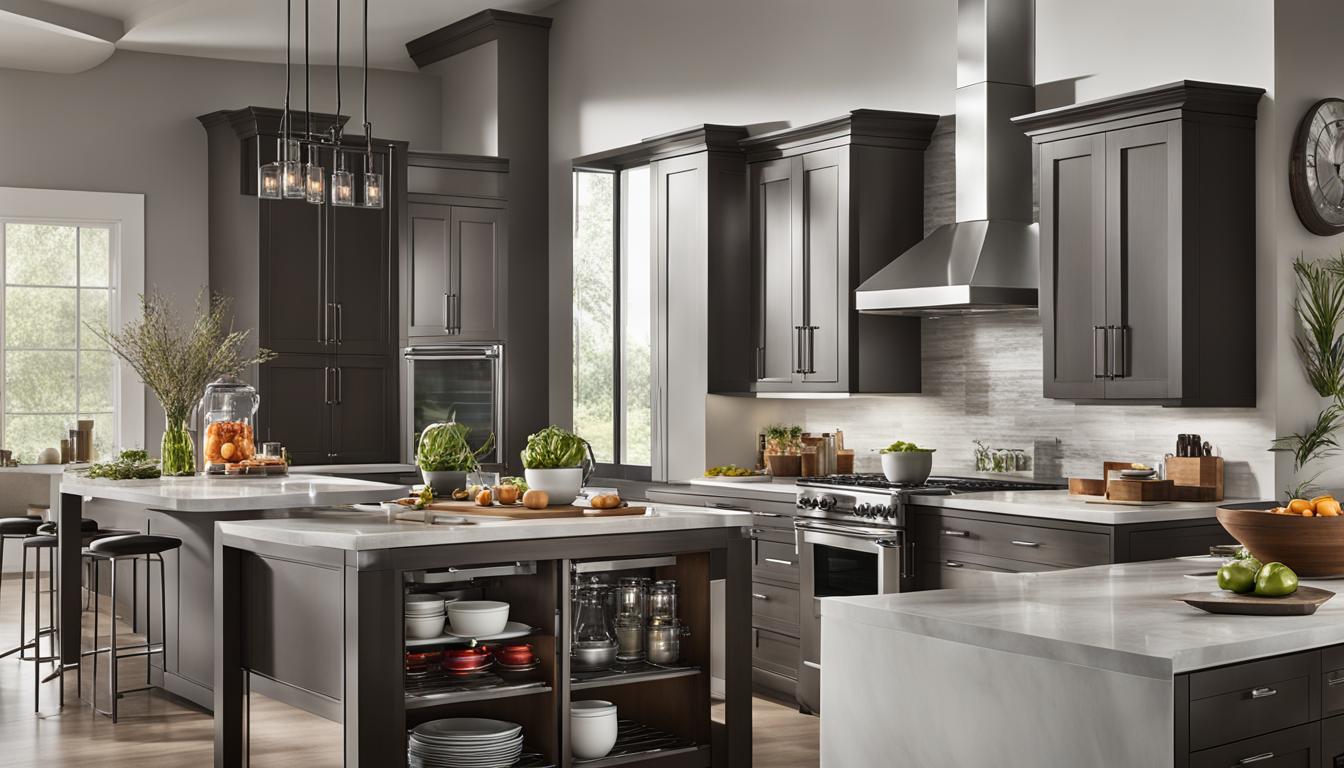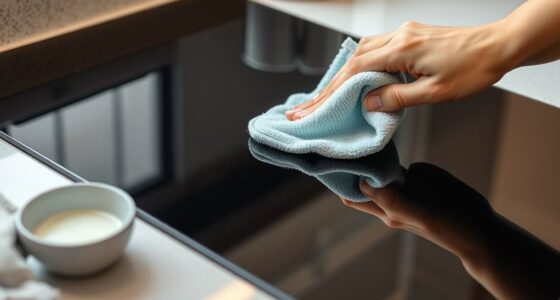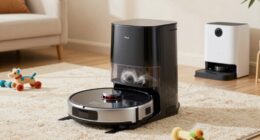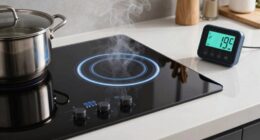Are you fed up with electrical accidents ruining your day? Your search ends here! We have put together 15 crucial tips for electrical appliance safety in the United States that will make you an expert in electrical safety.
From understanding regulations to promoting safety in the workplace, our tips cover all aspects of electrical appliance safety.
You’ll learn the importance of regular inspections, proper handling and storage of cords, and safe appliance installation techniques. We’ll also guide you on ensuring grounding and wiring safety, fire prevention measures, and the significance of surge protectors.
Don’t let electrical accidents ruin your peace of mind. With our expert tips, you’ll be equipped with the knowledge to keep yourself and your appliances safe.

Key Takeaways
- UL certification guarantees appliance safety by covering electrical and fire safety, mechanical hazards, and radiation emissions.
- Regular inspections of electrical appliances prevent accidents, maintain safety, and ensure proper functionality.
- Identifying and addressing potential hazards promptly reduces the risk of electrical fires and accidents.
- Proper handling and storage of electrical cords, such as organizing cords, avoiding overloading outlets, and protecting cords from damage, is crucial for electrical appliance safety.
Understanding US Electrical Appliance Regulations
To understand US electrical appliance regulations, we must familiarize ourselves with the key safety standards established by regulatory bodies. These standards have been put in place to ensure the safety of consumers and minimize the risk of accidents and injuries caused by electrical appliances.
One of the most important US electrical appliance standards is the Underwriters Laboratories (UL) certification. This certification guarantees that the appliance has undergone rigorous testing and meets the necessary safety requirements. UL certification covers a wide range of factors, including electrical and fire safety, mechanical hazards, and radiation emissions.
Another crucial standard is the National Electrical Code (NEC), which provides guidelines for the installation and use of electrical systems. The NEC outlines the proper wiring methods, grounding requirements, and load calculations, among other things. Adhering to these guidelines helps prevent electrical malfunctions and potential hazards.
Understanding these standards is essential for consumers, as it allows them to make informed decisions when purchasing electrical appliances. By choosing products with the appropriate certifications and meeting the necessary safety standards, consumers can reduce the risk of common appliance hazards such as electrical shocks, fires, and short circuits.

Importance of Regular Appliance Inspections
Regular appliance inspections are crucial for preventing electrical accidents and ensuring the proper functionality of electrical appliances. By conducting routine inspections, we can identify any potential hazards or malfunctions before they escalate into serious problems.
These inspections help to maintain the safety and reliability of our electrical appliances, giving us peace of mind and reducing the risk of electrical fires or other accidents.
Preventing Electrical Accidents
Regular inspections of electrical appliances are essential in preventing electrical accidents. By conducting regular inspections, you can identify potential hazards and address them before they lead to serious accidents.
Here are three key reasons why regular appliance inspections are crucial for preventing electrical accidents:

- Detecting faulty wiring: Regular inspections allow you to identify any signs of faulty wiring, such as frayed cords or loose connections. By addressing these issues promptly, you can prevent electrical fires and other accidents caused by faulty wiring.
- Checking for damaged components: Inspecting your electrical appliances regularly helps you identify any damaged components, such as cracked outlets or damaged plugs. By replacing these components, you can prevent electrical accidents and ensure the safe operation of your appliances.
- Identifying outdated appliances: Regular inspections also enable you to identify outdated appliances that may pose a higher risk of electrical accidents. By replacing these appliances with newer, safer models, you can significantly reduce the chances of accidents occurring.
Ensuring Appliance Functionality
By conducting regular inspections, we can ensure the functionality of our electrical appliances and prevent potential hazards. Ensuring appliance durability is essential for maintaining a safe and efficient home. Regular inspections allow us to identify and troubleshoot appliance issues before they become major problems. To help you keep track of your inspections, we have created a table that outlines the key components to inspect and the recommended frequency of inspections:
| Appliance Component | Recommended Inspection Frequency |
|---|---|
| Power cords | Every 6 months |
| Outlets | Annually |
| Wiring | Every 2 years |
| Heating elements | Every 1 year |
| Safety features | Every 6 months |
Proper Handling and Storage of Electrical Cords
When handling and storing electrical cords, we must prioritize safety to prevent accidents. Here are three essential tips for safe cord storage and preventing cord tangling:
- Organize cords with cord organizers or cable ties: Utilize cord organizers or cable ties to keep your cords neatly organized. These tools help prevent cords from becoming tangled, reducing the risk of tripping hazards and damage to the cords themselves. By keeping cords organized, you can easily identify and access the right cord when needed.
- Avoid overloading electrical outlets: Overloading electrical outlets by plugging in too many cords can lead to overheating and potential fire hazards. Be mindful of the wattage of the devices you’re connecting and ensure that you distribute the load evenly across multiple outlets or power strips. This will help prevent overheating and reduce the risk of electrical accidents.
- Store cords in a safe and dry location: To ensure the longevity of your electrical cords, store them in a safe and dry location. Avoid placing them near water sources or areas with high humidity as moisture can damage the cords and increase the risk of electrical shock. Additionally, store cords away from sharp objects or heavy items that could potentially damage them.
Tips for Safe Appliance Installation
Let’s ensure the safe installation of electrical appliances by following these essential tips. Safe installation practices are crucial to prevent accidents and ensure the longevity of your appliances. Here are some appliance installation guidelines to keep in mind.
First and foremost, always read the manufacturer’s instructions before beginning the installation process. These instructions provide valuable information on proper installation techniques and safety precautions specific to the appliance.

Next, make sure to choose an appropriate location for your appliance. Ensure there’s enough space for proper ventilation and easy access for maintenance. Avoid placing appliances near flammable materials or in areas prone to moisture or extreme temperatures.
When connecting the appliance to the power source, double-check that the voltage requirements match. Using a voltage higher than what the appliance can handle can result in damage or even electrical fires.
Furthermore, always use the correct wiring and connectors specified by the manufacturer. Avoid using extension cords whenever possible and opt for direct wiring to minimize potential hazards.
Lastly, it’s crucial to have a qualified professional handle the installation if you’re unsure of the process. They have the expertise to ensure a safe and efficient installation.

Ensuring Grounding and Wiring Safety
To ensure grounding and wiring safety, we must prioritize proper installation techniques and adherence to manufacturer’s guidelines. Proper grounding and wiring are crucial for the safe operation of electrical appliances.
Here are three key points to consider:
- Ensuring proper grounding: Grounding is the process of connecting electrical equipment to the earth to prevent electrical shock and reduce the risk of fire. It involves the use of grounding wires, grounding rods, and grounding electrodes. By ensuring proper grounding, we can prevent electrical faults and protect both people and property.
- Importance of proper wiring: Proper wiring is essential for the safe and efficient functioning of electrical appliances. It involves correctly connecting wires, using appropriate wire sizes, and following wiring diagrams. Incorrect wiring can lead to short circuits, overheating, and electrical fires. By following proper wiring practices, we can minimize these risks and ensure the longevity of our electrical appliances.
- Regular inspections and maintenance: Regular inspections and maintenance are crucial for identifying potential grounding and wiring issues. It’s important to periodically check the condition of wires, connections, and grounding systems. Any signs of damage or wear should be addressed promptly to prevent accidents.
Avoiding Overloading Electrical Circuits
To avoid overloading electrical circuits, we must adhere to proper load calculations and distribute power evenly throughout our electrical system. Overloading circuits can lead to serious consequences, such as electrical fires and electrical shocks. It’s crucial to understand the power requirements of each electrical appliance and device in order to prevent overloading.
When calculating the load on a circuit, we need to consider the wattage of each device connected to it. This information can usually be found on the device itself or in the manufacturer’s documentation. By adding up the wattage of all the devices connected to a circuit, we can determine if it’s within its safe operating range.

Distributing power evenly across circuits is also important. Avoid plugging multiple high-wattage appliances into the same circuit, as this can overload it and increase the risk of electrical fires. It’s recommended to spread out the load by connecting appliances to different circuits.
Additionally, it’s crucial to regularly inspect the condition of electrical outlets and wiring. Loose or damaged connections can lead to increased resistance and overheating, which can result in electrical fires. If you notice any signs of damage or wear, it’s important to have a qualified electrician address the issue promptly.
By following proper load calculations, distributing power evenly, and maintaining electrical system integrity, we can effectively prevent overloading electrical circuits and reduce the risk of electrical fires and shocks.
Now, let’s move on to discussing the proper use of extension cords and power strips, which are essential for maintaining electrical safety in our daily lives.

Proper Use of Extension Cords and Power Strips
When it comes to the proper use of extension cords and power strips, there are a few key points to keep in mind.
First, it’s important to ensure that the cord length is appropriate for the task at hand, as using cords that are too long can increase the risk of tripping hazards and electrical hazards.
Additionally, it’s crucial to avoid overloading power strips by plugging in too many devices, as this can lead to overheating and potential fire hazards.
Lastly, it’s essential to avoid daisy-chaining extension cords together, as this can also increase the risk of overloading and potential electrical hazards.

Safe Cord Length
For optimal electrical appliance safety, we must consider the appropriate length of cords when using extension cords and power strips. It’s crucial to ensure that cords are used correctly and stored safely to prevent accidents and electrical hazards. Here are three important points to keep in mind:
- Proper cord use: When using extension cords or power strips, make sure to choose the right cord length for your needs. Avoid using cords that are too short, as they may be stretched or pulled, causing damage to the cord or the connected appliances. On the other hand, using excessively long cords can create a tripping hazard and increase the risk of accidents.
- Safe cord storage: When not in use, cords should be stored properly to prevent tangling, fraying, or damage. Avoid wrapping cords tightly around objects, as this can lead to kinks and weaken the cord’s insulation. Instead, consider using cord reels or organizers to keep them neat and untangled.
- Regular inspection: It’s essential to regularly inspect cords for any signs of wear, such as fraying, exposed wires, or damaged plugs. If you notice any damage, replace the cord immediately to avoid the risk of electrical shock or fire.
Overloading Power Strips
To ensure the safe use of extension cords and power strips, it’s crucial that we avoid overloading them. Overloading power strips is a common cause of electrical accidents and can lead to power strip fires and other hazards. Power strips are designed to handle a specific amount of electrical load, and exceeding this limit can result in overheating and potentially ignite nearby combustible materials.
To prevent power strip fires and avoid power strip hazards, it’s important to follow manufacturer’s guidelines and never exceed the maximum wattage or current rating specified for the power strip. Additionally, it’s recommended to periodically check the cords and plugs for any signs of damage or wear, as these can also contribute to power strip accidents.
By being mindful of the load capacity and maintaining the condition of the power strips, we can ensure a safer electrical environment.

Now, let’s move on to the next topic – avoiding daisy-chaining cords.
Avoid Daisy-Chaining Cords
To avoid potential hazards, we must understand the importance of avoiding daisy-chaining cords and using extension cords and power strips properly. Proper cord organization and electrical cord maintenance are crucial for ensuring the safety of your electrical appliances.
Here are three essential tips to keep in mind:
- Avoid daisy-chaining cords: Daisy-chaining refers to the practice of connecting multiple extension cords or power strips together, which can overload the circuit and pose a fire risk. Instead, use a single, heavy-duty extension cord or power strip that can handle the power requirements of your devices.
- Choose the right extension cord: When selecting an extension cord, make sure it’s rated for the intended use. Consider factors such as the length, wire gauge, and amp rating to ensure it can safely handle the electrical load.
- Inspect cords regularly: Regularly inspect your extension cords and power strips for any signs of damage, such as fraying, exposed wires, or loose connections. Replace any damaged cords immediately to prevent electrical hazards.
The Dangers of DIY Appliance Repairs
DIY appliance repairs pose significant dangers that can lead to serious injury or property damage. While it may be tempting to save money by attempting to fix electrical appliances ourselves, it’s important to understand the potential risks involved. The dangers of amateur repairs are numerous, and it’s crucial to be aware of the hazards of DIY fixes.

One of the primary risks of DIY appliance repairs is the potential for electrical shock. Electrical systems can be complex, and without proper knowledge and expertise, it’s easy to make mistakes that can result in electrocution. Additionally, working with live wires or faulty electrical components can cause fires, putting not only the repair person at risk but also the entire property.
Another danger of DIY appliance repairs is the possibility of causing further damage to the appliance itself. Electrical appliances are intricate systems, and attempting repairs without the necessary understanding can lead to irreversible harm. This can result in costly repairs or even the need for a complete replacement.
Safe Practices for Cleaning Appliances
When it comes to safe practices for cleaning appliances, there are several important points to consider.
First, it’s crucial to use proper cleaning techniques to avoid damaging the appliance or causing electrical accidents.

Second, taking preventive measures such as unplugging the appliance before cleaning and avoiding the use of water near electrical components can greatly reduce the risk of accidents.
Lastly, regular maintenance and inspection of appliances can ensure their continued safety and functionality.
Proper Cleaning Techniques
We always make sure to follow safe practices for cleaning our appliances. Proper cleaning techniques are essential to maintain the efficiency and longevity of electrical appliances.
Here are some common cleaning mistakes to avoid and tips for proper cleaning:

- Use gentle, non-abrasive cleaners: Avoid harsh chemicals or abrasive materials that can damage the appliance’s surface or internal components.
- Pay attention to electrical connections: Before cleaning, ensure that the appliance is unplugged to avoid the risk of electric shock. Take extra care when cleaning around electrical connections.
- Clean filters regularly: Many appliances, such as air conditioners or vacuum cleaners, have filters that need to be cleaned or replaced periodically. Neglecting this can lead to reduced performance and increased energy consumption.
Preventing Electrical Accidents
To prevent electrical accidents while cleaning appliances, it’s important to follow safe practices.
One of the key steps in preventing electrical fires is to ensure that appliances are unplugged before cleaning. This eliminates the risk of accidental electric shock or short circuits.
Additionally, it’s crucial to avoid using water or any liquid near electrical appliances, as this can lead to electrical shock or damage to the appliance. When cleaning, always use dry and non-conductive materials such as microfiber cloths or brushes.
It’s also important to teach children about electrical safety. Make sure they understand the dangers of playing with electrical appliances and the importance of never inserting objects into outlets or prying open electrical devices.

Maintenance for Appliance Safety
For the proper maintenance of appliance safety, it’s essential to regularly clean and inspect electrical appliances. Neglecting this crucial step can lead to potential hazards and decrease the lifespan of your appliances.
Here are three maintenance techniques to keep your appliances safe and functioning optimally:
- Regularly clean the exterior and interior of appliances to remove dust, grime, and debris that can interfere with their performance.
- Inspect cords, plugs, and sockets for any signs of wear or damage. Replace any frayed or damaged cords immediately to prevent electrical accidents.
- Check and clean filters, vents, and coils regularly to ensure proper airflow and prevent overheating, which can cause appliance malfunctions.
Childproofing Electrical Appliances
Our top priority is ensuring the safety of children around electrical appliances. Childproofing electrical appliances is an essential step to prevent electrical accidents and protect our little ones. Here are some important tips to consider:
- Outlet covers: Install childproof outlet covers on all accessible electrical outlets. These covers will prevent children from sticking their fingers or objects into the outlets, reducing the risk of electric shock.
- Cord management: Keep cords out of reach by using cord organizers or hiding them behind furniture. Long cords can be a tripping hazard or tempt children to pull on them, potentially causing appliances to fall or come into contact with water.
- Secure appliances: Secure heavy or unstable appliances, such as televisions or microwaves, to prevent them from toppling over if a child pulls on the cord or tries to climb on them.
- Store away appliances: Store small appliances, like hair dryers or curling irons, in locked cabinets or drawers when not in use. This prevents curious children from accidentally turning them on or coming into contact with hot surfaces.
- Educate and supervise: Teach children about the dangers of electrical appliances and the importance of keeping their hands away from them. Always supervise young children when they’re near electrical appliances.
Recognizing Warning Signs of Appliance Malfunction
When it comes to ensuring the safety of our electrical appliances, it’s crucial for us to be able to recognize the warning signs of appliance malfunction. By familiarizing ourselves with the common hazards and troubleshooting appliance issues, we can take proactive steps to prevent accidents and protect our homes.

Here are three key indicators to watch out for:
- Strange odors: If you notice a burning smell or any unusual odors coming from your appliance, it could be a sign of overheating or electrical malfunction. Immediately unplug the appliance and have it inspected by a qualified professional.
- Frequent tripping of circuit breakers: If your appliance frequently causes the circuit breaker to trip, it may be overloading the electrical system. This could be due to a faulty component or excessive power consumption. Consult an electrician to determine the cause and prevent potential fire hazards.
- Sparks or electrical arcing: If you see sparks or electrical arcing when you plug in or use an appliance, it’s a clear indication of a serious problem. Turn off the appliance and refrain from using it until it has been examined and repaired by a professional.
By recognizing these warning signs, we can address appliance malfunctions promptly and minimize the risk of electrical fires.
In the next section, we’ll explore fire prevention measures for electrical appliances, further enhancing our safety knowledge and practices.
Fire Prevention Measures for Electrical Appliances
To prevent fires caused by electrical appliances, we need to be mindful of two key factors: overloaded power outlets and regular appliance maintenance.

Overloaded power outlets can lead to overheating and electrical fires, so it’s important to distribute the load evenly and use power strips with surge protection.
Regular maintenance, such as cleaning and inspecting appliances for any signs of wear or damage, can help identify potential fire hazards and prevent accidents.
Overloaded Power Outlets
We must ensure that power outlets aren’t overloaded to prevent potential fires caused by electrical appliances. Overloaded power outlets can lead to overheating and electrical arcing, which can ignite flammable materials nearby.
To avoid such risks, it’s crucial to follow these fire prevention measures for electrical appliances:

- Use power strips sparingly: Power strips should only be used when necessary and not as a permanent solution for lack of outlets.
- Distribute the load: Spread out the appliances across different outlets to prevent overloading a single circuit.
- Avoid daisy-chaining: Plugging one power strip into another can overload the circuit and increase the risk of electrical fires.
Regular Appliance Maintenance
To ensure the safety of our electrical appliances, we prioritize regular maintenance by inspecting and cleaning them on a consistent basis. By following a regular maintenance schedule, we can identify and address any common appliance issues before they escalate into more serious problems. Regular maintenance involves checking for loose connections, frayed wires, and signs of wear and tear.
It’s important to clean appliances regularly, removing any dust or debris that may accumulate over time. Additionally, it’s crucial to keep appliances away from flammable materials and to ensure proper ventilation to prevent overheating. Regular maintenance not only extends the lifespan of our appliances but also reduces the risk of electrical fires. By taking these preventative measures, we can safeguard our appliances and maintain a safe environment in our homes.
Transitioning into the next section, let’s now discuss the importance of surge protectors for appliance safety.
Importance of Surge Protectors for Appliance Safety
Using surge protectors is essential for ensuring the safety of our electrical appliances. Surge protectors are devices that protect our appliances from power surges, which can occur due to lightning strikes, electrical faults, or power grid fluctuations.

Here are three reasons why surge protectors are crucial for appliance safety:
- Protection against voltage spikes: Surge protectors are designed to divert excess voltage away from our appliances, preventing damage caused by power surges. By limiting the voltage to a safe level, surge protectors safeguard our appliances from potential electrical hazards.
- Safeguarding sensitive electronic components: Many modern appliances, such as computers, televisions, and smartphones, contain delicate electronic components that are highly susceptible to power surges. Surge protectors help shield these sensitive devices from voltage fluctuations, ensuring their longevity and optimal performance.
- Insurance for valuable appliances: Electrical appliances can be expensive investments, and repairing or replacing them due to electrical damage can be a significant financial burden. Surge protectors act as insurance, providing peace of mind by minimizing the risk of damage and extending the lifespan of our appliances.
Safe Operation of Outdoor Electrical Appliances
For optimal safety of our electrical appliances, it’s important to ensure the safe operation of outdoor electrical appliances. When it comes to safe outdoor lighting, it’s crucial to use fixtures that are specifically designed for outdoor use. These fixtures are built to withstand exposure to the elements and provide adequate protection against moisture and dust.
Additionally, it’s essential to properly weatherproof outdoor electrical appliances to prevent any damage or accidents. This includes using weatherproof covers for outlets and ensuring that all connections are properly sealed.
Furthermore, it’s important to follow manufacturer instructions and guidelines for the safe operation of outdoor electrical appliances. This includes avoiding overloading circuits and using extension cords that are designed for outdoor use. It’s also recommended to regularly inspect outdoor electrical appliances for any signs of wear or damage and promptly address any issues that are identified.

By ensuring the safe operation of outdoor electrical appliances, we can minimize the risk of accidents and damage. This will create a safer environment for everyone and promote overall electrical appliance safety.
Moving forward, let’s now discuss the importance of promoting electrical appliance safety in the workplace.
Promoting Electrical Appliance Safety in the Workplace
In the workplace, we prioritize the promotion of electrical appliance safety to ensure the well-being of all employees. It’s crucial to create awareness about workplace electrical safety and provide necessary guidelines to prevent accidents and injuries.
Here are three key strategies to promote electrical appliance safety in the workplace:

- Conduct regular training sessions: Organize training programs to educate employees about the safe and proper use of electrical appliances. This should include information on identifying potential hazards, understanding electrical safety codes, and proper maintenance of appliances.
- Implement safety protocols: Establish clear and concise safety protocols that outline the procedures for using electrical appliances in the workplace. These protocols should include guidelines for proper installation, inspection, and maintenance of electrical equipment, as well as procedures for reporting any electrical issues or malfunctions.
- Display safety signage: Place visible safety signage in areas where electrical appliances are used or stored. These signs should remind employees of the potential dangers and provide instructions on safe practices, such as unplugging appliances when not in use and using proper protective equipment.
Frequently Asked Questions
Are Surge Protectors Necessary for All Electrical Appliances?
Surge protectors are essential for protecting electrical appliances from power surges. They provide benefits such as preventing damage to delicate electronics and extending the lifespan of appliances.
While surge protectors aren’t necessary for all appliances, they’re highly recommended for those that are expensive or sensitive to electrical fluctuations.
Alternatives to surge protectors include voltage regulators and uninterruptible power supply (UPS) systems. These options also provide protection against power surges and can be used depending on the specific needs of the appliances.
What Are Some Common Warning Signs of Appliance Malfunction?
When it comes to signs of appliance malfunction, it’s crucial to pay attention to any unusual behavior or strange noises coming from your electrical appliances. These warning signs can be an indication of a malfunctioning component or a potential electrical hazard.

For example, if your refrigerator starts making loud buzzing sounds or if your toaster suddenly stops working, it’s important to investigate further and seek professional help if needed. Ignoring these signs can lead to further damage or even electrical accidents.
How Often Should Electrical Appliances Be Inspected for Safety?
Electrical appliances should be inspected regularly for safety. The frequency of these inspections depends on various factors, such as the age and condition of the appliance, as well as the manufacturer’s recommendations.
Regular maintenance is crucial to ensure that appliances are functioning properly and to identify any potential hazards or malfunctions. By conducting these inspections at appropriate intervals, we can minimize the risk of electrical accidents and ensure the longevity of our appliances.
What Are the Potential Dangers of DIY Appliance Repairs?
Potential dangers of DIY appliance repairs can include electrical shock, fire hazards, and improper repairs leading to further damage. It’s essential to understand the complexities of electrical systems and have the necessary knowledge and skills to safely handle repairs.

Safety precautions such as disconnecting power sources, using proper tools, and following manufacturer guidelines should always be followed. Remember, ‘Better safe than sorry’ when it comes to electrical appliance repairs.
How Can Employers Promote Electrical Appliance Safety in the Workplace?
To promote electrical appliance safety in the workplace, employers should prioritize training and maintenance.
By providing comprehensive training programs, employees will be equipped with the knowledge and skills necessary to handle electrical appliances safely.
Regular maintenance checks should also be conducted to ensure that appliances are in good working condition and to identify any potential hazards.

These measures help to minimize the risk of accidents and ensure a safe working environment for all employees.
Should I Follow Safety Tips for Residential Electrical Appliances When Dealing with Commercial Appliance Repairs?
When dealing with commercial appliance repairs, it’s important to follow safety tips for commercial repairs to avoid potential risks. Even if you have experience with residential electrical appliances, commercial repairs may present different hazards. It’s crucial to prioritize safety by adhering to industry-specific tips for commercial repairs.
Conclusion
In conclusion, ensuring electrical appliance safety is of utmost importance in our daily lives. By following these essential tips, such as understanding regulations, conducting regular inspections, and properly handling cords, we can minimize the risk of accidents and promote a safer environment.
Additionally, installing surge protectors, practicing fire prevention measures, and maintaining grounding and wiring safety are crucial for protecting ourselves and our valuable appliances.
Let’s prioritize appliance safety to prevent potential hazards and enjoy a worry-free experience.










